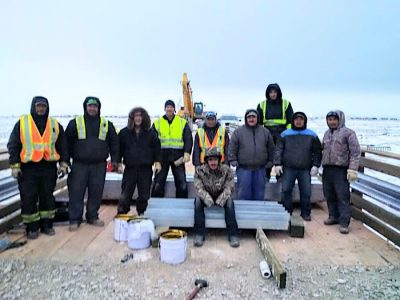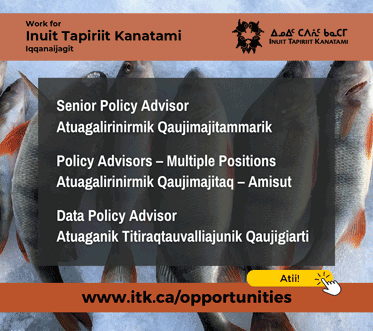Workers from Sudliq Developments Ltd. in Coral Harbour work on a 2016 bridge project outside the Kivalliq community. This year, Sudliq, an Inuit-owned company, did not get a chance to bid on another bridge contract, although it did receive a subcontract for the labour portion of the 2020 contract (Photo courtesy of Dino Bruce)
Nunavut contractor upset about procurement “loophole” for municipalities
Municipalities are exempt from NNI procurement policy
A lucrative contract to build a bridge in Coral Harbour this summer went to a company outside the territory, much to the dismay of Dino Bruce, operations manager for Sudliq Developments Ltd., a local company that built three bridges around the community in the past.
The loss of this contract for a fourth bridge came as a surprise to Bruce, who said he learned only after the fact that the municipality had sole-sourced the entire contract outside the territory.
“With the experience and the manpower we have, when we found out the job was sourced out, you’re wondering what did we do wrong to not be given the opportunity to take on this job,” Bruce said.
On this summer’s bridge project, a company based outside Nunavut had provided the engineering design and ordered the materials.
“We had anticipated that the labour component would be tendered out, but the municipality ended up sole-sourcing to this company for the entire project,” Bruce said.
“It was very strange the way it came out,” he said, although Sudliq did receive a subcontract for the labour portion of the bridge work, he said.
As a subcontract, the job on the latest bridge did provide work to Sudliq’s 15 to 20 seasonal workers.

Some of Sudliq’s staff on the bridge they built in 2016: from left to right, Sandy Saviakjuk, Dino Bruce, Louie Bruce and Nathan Nakoolak. (Photo courtesy of Dino Bruce)
For them, even one week of missed work can make the difference on whether or not they receive employment insurance, Bruce said.
“It doesn’t just affect the seasonal workers, but their families as well,” he said.
The municipality and others in Nunavut are allowed to sole-source a contract through what Bruce called “a loophole” in the Government of Nunavut’s Nunavummi Nangminiqaqtunik Ikajuuti policy, which is supposed to give priority to Inuit companies when awarding contracts.
The NNI policy is supposed to uphold Article 24 of the Nunavut Agreement—an article that states Inuit firms should have priority over other companies competing for government contracts.
But section 4.3 of the NNI policy says municipalities are exempt from this policy, “so they can basically hire people at their discretion from wherever,” as Bruce put it.
“As long as the loophole is there for municipalities, our businesses will continue to [be] vulnerable,” Bruce said.
The Nunavut Association of Municipalities said the GN did provide a procurement policy template to municipalities a couple of years ago.
The policy suggests that sole-source procurement should be only used in emergencies when there is only one vendor that can supply the product or service.
The GN has requested that municipalities follow its procurement policy, the NAM said.
But municipalities ultimately decide how they will conduct their procurement and comply with regulations, the NAM said.
According to the suggested procurement policy, “any sole source exceeding $50,000 will require a staff report to, and approval by council.”
When contacted, Mayor Willie Nakoolak said he could not offer any comment about the contract issue and what he or the councillors knew about the 2020 bridge contract, because he said he wanted to obtain more information first.
“I cannot and will not give any information in regards to the contract issue,” he said.
Exemptions to the competitive quotation or bidding process can be approved by the senior administrative officer of a municipality under certain circumstances, the NAM said.
The SAO of Coral Harbour, Leonie Pameolik, told Nunatsiaq News that the move to sole-source the bridge contract took place before she became SAO.
But she suggested the problem with using a local company might have been that there are no engineers in Nunavut.
But Bruce said there was no question Sudliq was able to carry out the bridge construction: if he didn’t have the engineering capacity needed on his staff, he would have subcontracted it out.
This is what he did with the three other bridges that Sudliq built around Coral Harbour in the past.
Sudliq, started by Bruce’s father in 1986, is primarily engaged in the transportation and construction industries. It also provides fuel delivery, snow clearing and cartage services.
In 1998 and 1999, Sudliq built what is still the longest bridge in Nunavut, at 84 metres long, as well as two other bridges, 13 and 30 metres long respectively, in 2016, as general contractors.
“We have the staff and kind of equipment to undertake this kind of project,” Bruce said of this summer’s bridge construction. “We designed, supplied material and labour for this project in 2016.”
But he alleged this summer’s $1.7 million contract was handed out “under a cloud of secrecy.”
There was really no transparency at all, he said.
“When there is no transparency in all layers of government, there are always going to be questions and doubts always, and when there is no accountability there is always going to be discord,” Bruce said. “I believe that this is not an isolated case at all, as I have talked to other contractors in the region.”
The Nunavut Agreement also offers some protections to companies like Sudliq.
Section 24.5.2 of the land claim agreement says: “Where an Inuit firm has previously been awarded a government contract, and has successfully carried out the contract, that Inuit firm shall be included in the solicitation to bid for contracts of a similar nature.”
And, in a sole-source contract, Inuit firms also have preference, according to Section 24.5.3: “In the absence of competitive bidding for government contracts, qualified Inuit firms will be given fair consideration.”
But Bruce said Sudliq wasn’t given any opportunity to bid on the job, although they had experience with big projects.
In this community of about 1,000 people, Sudliq is a major employer of Inuit.
“We have we were able to hire 90 per cent Inuit in 2016,” he said.







Looks like previous SAO made the decision and run? Very common in these environments
The NNI basically means that the Territory is willing to pay up to 25% more for infrastructure in the Territory. Inuit firms need to start competing on price, as the infrastructure deficit caused by this is making a select few Inuit families very wealthy, and southern companies with Inuit frontmen very rich! Hamlets do not have the funds or the luxury to pay these extra funds, they need to provide the most benefit to all community members for the most reasonable cost. While I do agree they should be more transparent in this process as a Hamlet. NNI needs to be revamped to provide the most benefit to the community members and should not be base the majority of the bid adjustments on Inuit ownership but on Inuit employment and Inuit apprenticeship hours gained to completing their certification in the trades. We need to benefit all Inuit in our projects in Nunavut, not just a handful of wealthy families.
I completely agree. NNI benefits a select few and creates a administrative nightmare.
How many more much needed houses could the NU gov build if they removed NNI?
Bingo! NNI needs to be scrapped. It does nothing for Nunavut except make our projects far more expensive.
This sounds like an old Inuit mentality.From my observation as a kabluunaq, Inuit will pull each other down to make sure none of the other Inuit are successful. Inuit should be encouraging each other and uplifting each other. As a matter of fact Inuit would rather help a kablunnaq do businesses in their towns. The company as stated is Inuit owned and hires all Inuit. I would think the Nunavut Government and NTI would be very happy about that. Nunavut is about Inuit taking control of their lives. Article 24 is the law as its an agreement with the Canadian government. All other policies in Nunavut fall under the Agreement.
The Hamlet act states very clearly that Hamlets cannot compete with a local business. The sole contract would have to be approved by the Minister. This shows cabinet and the Hamlet are not supportive of local companies and especially those that are Inuit owned. The SAO of Coral Harbour, Leonie Pameolik, told Nunatsiaq News that the move to sole-source the bridge contract took place before she became SAO.I remember she was the SAO when I contacted her about housing about 10 years ago. The Sole contract is not 10 years old. The Hamlet council has been not careful enough to know the details of what’s happening behind the office of the SAO. The Mayor is certainly not keeping track of what’s been happening in his role as Mayor.
The NNI is so abused that this article should be asking about the policy and not whether the contractor here can avail themselves of it. 25% more for the same work by an ‘Inuit Firm’, aka a new company fronted by wealthy Inuit for a kickback but managed by the southern company entirely, is unsustainable. Article 24 can be honored without allowing a select few wealthy Inuit who front southern company bids profit at the 25% expense of the rest of the territory, most of whom are Inuit. Whoever came up with this policy likely has personal interests in the private sector since you can’t make up such a bad policy unless there are conflicts of interest behind it.
Typical comments from the peanut gallery. This policy was first created to enable more training of red seal trades apprentices. With more non-Nunavummiut handling the reins, the entire policy is made unusable but what do you expect when CGS has its’ only cliche or niche (Atlantic origins) of contract awardees. It can be worse in the various regions depending on who made the decision and whether HQ or the politicians had a chance to review/overturn the decision.
The original reasons were to enable Inuit to become trades persons, create local companies to train local construction workers and apprentices, enable small companies to bid on sections they could manage such as labour and allow companies to become more experienced in the construction sectors.
The entire policy has been rendered useless by non-Inuit RFP specialists who like to give out contracts to non-Inuit relatives and companies so that Inuit will remain powerless in the communities as I have seen it play out with the RIA business arms, in this case probably Sakku. When Inuit become successful, the non-Inuit bureaucracy doubles down to try to bring them down and their Inuit fronters are quite vocal and quickly disappear once the cadre of the old guard choose the contracts to be awarded.
It is sad that outsiders have taken this policy hostage as the intentions were to create businesses and an Inuit labour pool within construction. However, many government workers, especially the systemic racists pretend to be a friend and attack you or your company the moment your back is turned. Hopefully many of the really bad ones will retire soon…you can almost write a book about each region, the bad apples and the Inuit who took advantage of the system.
There are some really good all Inuit companies that work hard to support their owners, employees, their families and communities and to keep afloat. Sometimes it is almost like being the Toronto Raptors in the sense that not only are you competing with the other teams, you are also fighting against the referees and the system.
NNI should be all about local companies. Only local companies benefit the community they are in 100% as all funds paid out by the government stay within the community. A local company is locally owned and operated 24 / 7, 365 days a year. They have a majority of local employees and are not set up for one or two jobs. Even so all contracts should be tendered out following government contracting procedures and should be open and transparent. I have issues with GN departments doing work in house (this means they hire tradesmen from the south and hire a local labourer to work with them) as there is very little benefit to the community besides the work being completed. They don’t even enter them into apprenticeships. This has been going on for years and there is no end in site. The GN and particularly the Housing Corp. has not changed they way they operate on a daily basis since they were formed. Same old same old, rent scale, public housing, lack of units, poor maintenance, no support for people who want to become homeowners, no wonder they cannot get anywhere. The most crucial thing we need in Nunavut is housing. Come on NHC your up to $600,000 a unit for five-plexes, that is ridiculous. If things don’t change there will never be enough housing to go around so our social. mental and health problems will never end. Local companies are local people trying to make things better. Anyone who operates a local business in a Nunavut community should be congratulated on doing everything they can to improve our lives. Anyone operating a successful local business in any of the outlying communities (not a transportation hub) are quite rare. These companies need every opportunity to grow. The only way to grow is to successfully complete, win and complete contracts.
The NNI Policy is unconstitutional.
.
Yes, it is.
.
The Nunavut Act is Federal Constitution Law. Article 24 of the Nunavut Act calls for the GN and the Government of Canada when operating in Nunavut, to assist Inuit owned businesses compete for government contracts.
.
But it also requires that this be done without increasing cost.
.
There are lots of ways to do this but the NNI Policy is not one of them.
.
North Baffiner says the NNI Policy was created to produce Red Seal Inuit Tradespeople.
.
Well, how many red seal Inuit tradepeople are there in Nunavut? How many have been trained and certified in the 20 years of Nunavut?
.
The GN produces lots of annual reports, but have you ever seen one that says how many Inuit received their red seal in the year?
.
And of those, how namy are in the construction trades?
.
I double-dog dare the Miniter to table such a report when the Ledge sits in a few weeks.
.
GN purchasing amounts to about one billion dollars each year, when you include all departments and corporations. That’s about $1,000,000,000 each year.
.
I’d love to divide that by the number of Inuit who earned their red seal in a construction trade last year. What a price.
Article 24 isn’t about economic development.
It’s about economic capture.
The municipality shouldn’t have sole-sourced a contract of this size.
Even if there was some reason why it had to be, some due diligence would have revealed a local company with the expertise.
No need to invoke the NNI – simple good governance is the main issue here.
Something tells me there is a lot more to this story than we have been told.
.
Anyone from Coral Harour care to fill us in?
.
NN, please investige thoroughly.
Unfortunately, NN reporters are tied up scouring twitter for sinners and heretics to publicly flog for their “wrong speak” (even when it is right). Woah unto ye who cross them, for ye shall know the wrath of the mob!
NNI users of it should be Disclosed Publicly as time how many are actually and factually run, operated, administered and see about their Hiring Policies and Practices.
Hamlets need to be under Access to Information and Freedom of Information Act as a Local Government as presently they are not Governed.
Meanwhile Territorial and Federal Government’s must comply to the Access to Information and Freedom of Information Act but Hamlets aren’t. Remember Baker SAO Zettler thefts? How many more in Hamlets?
Legislation should Table an Act enforcing Hamlets to comply as Territorial and Federal Governments as Disclosure.
Fact: Almost majority of Contracts under NNI are Non-Inuit married to Inuit and have kids use the loophole to run a business. Once get the contracts they hired outside help from other Provinces then hired by buddy system and naturally nepotism. Hint-check a central fuel contractor and how many outside people are hired and you’ll find nepotism and abuse of process. All related non-Inuit and local buddies and even former bay boys there too. The Inuit Minima staff just answer phones and clean up.
Like a central Business well known Fuel a Uncle and Nephew Non-Inuit run a major mining fuel contract using Inuk ex-wife and kids to operate administrative and his nephew was brought up and is now one of decision makers of company as a Non-Inuk and they brought in more hired family from East N.B. Hiring non-Inuit under NNI businesses. No one raises an eye because good little Eskimos don’t stand up and voice concerns.
Bluntly, you have former Bay Boys and former GNWT and GN non-Inuit Operating and running and hiring non-Inuit using common-law, spouse, wife, girlfriend, boyfriend or husband and parent of Inuit kids run businesses under NNI.
Legislation should table what NNI Inuit Businesses are actually run by Inuit. Loophole here. And rich off Inuit lands, blood and future to absorb self wealth for the duration of the mine.
Alll former Bay Boys, GNWT, and GN non-Inuit imprinted and run Inuit operations using NNI Guidelines. Some coming north with barely education but bay experience operate their own freely now using Inuit Title.
Not jealous or racist but sharing unspoken facts.
NNI should be tabled as what Inuit Beneficiaries actually run their NNI Businesses. Names….disclose names and if really Inuit operate and manage and have a say on operations as ownership or is it just in written title and run by non-Inuit.
Question it. Speak of it. Just look at your communities and see how many Non-Inuit run and operate owning NNI Inuit meant businesses and services are really not.
Non-Inuk Loopholes there…. unspoken, unaddressed, unnoticed, and people so oblivious and blind to this. NNI is FOR Inuit.